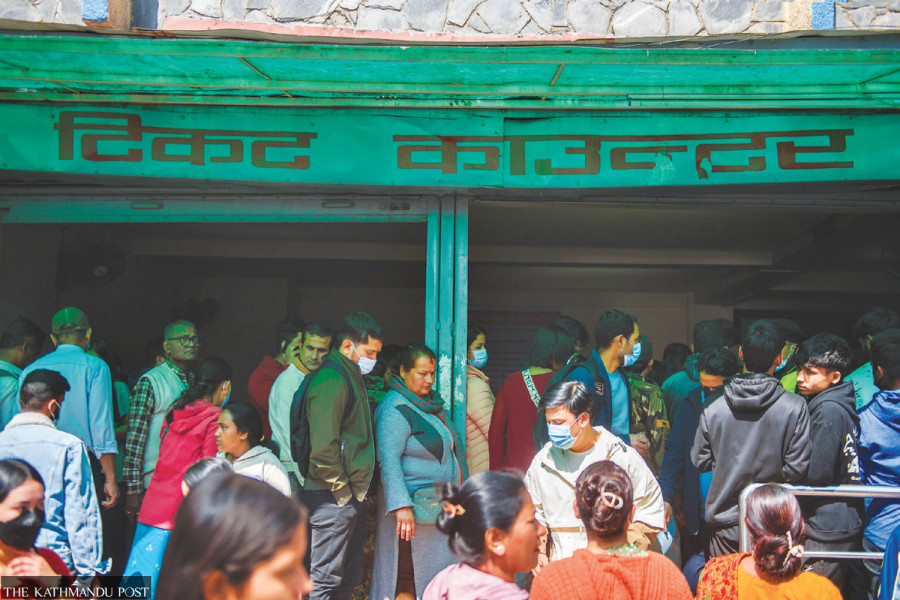Health
A third of beds at Bir Hospital gone due to staff shortage
Poor patients visiting the country’s oldest hospital from across Nepal are the hardest hit.
Arjun Poudel
Last week, Khadka Bahadur Budathoki, a liver patient from ward 5 of Champadevi Rural Municipality of Okhaldhunga district, was found lying on a metal bench outside the emergency ward of Bir Hospital. The 61 year-old, who was a regular patient of the hospital, recounted how his children brought him to the Bir emergency for treatment, only to be advised by doctors to take him to some other hospital due to lack of intensive care at the time.
“My father is a jaundice patient and his condition is serious,” said Subash, the patient’s son. “Doctors have asked us to take him to other hospitals, but that’s not easy for poor folks like us.”
Khadka is among dozens of patients who visit the country’s oldest hospital every day, but are deprived of treatment due to a shortage of beds.
The hospital, which used to have 960 general beds, has cut the number to 600. Likewise, the number of functioning intensive care unit beds has been reduced to 27 from 60.
Additionally, the hospital had 19 high-dependency unit beds, but they are not in use at present.
Despite the reduction in the number of beds by the hospital administration, the demand for treatment has not decreased. Every day over 3,000 patients from across the country arrive at the hospital seeking treatment. This is not only because it is the national referral center, but it also performs a vital public service—offering free treatment to the poor.
Due to the influx of patients, the hospital is overcrowded and lacks enough beds, compelling doctors to ask patients, even the impoverished from remote areas of the country, to seek treatment elsewhere.
“Getting treatment at Bir Hospital is not as easy as some people think,” said Reshma Dhakal, another patient seeking a gallstone removal surgery at the hospital. “We don’t have any option but to wait for our turn. People like me can’t afford treatment at private hospitals.”
The hospital’s emergency department remains crammed all the time with seriously ill patients. Most beds of the emergency department now accommodate three to four patients, as the number of beds has been reduced from 55 to 35. Some patients have to wait for up to three days to get transferred to the intensive care unit.
“It is not our choice to hold serious patients in the emergency for long,” said Dr Rakesh Singh, chief of the emergency department. “Most patients seeking treatment in our hospital cannot afford private care and end up waiting in the emergency for days to secure beds.”
Doctors at the hospital emergency said that seriously ailing patients sometimes wait in gurneys and wheelchairs to get treatment. In some cases, patients, when they run out of money in private hospitals, turn to Bir Hospital for treatment.
The hospital charges only Rs3,000 a day for intensive care, whereas most private hospitals charge more than Rs15,000. General beds at the hospital are free of charge to all patients, whereas patients have to pay thousands of rupees at private hospitals.
Patients who are admitted to the free beds also get free treatment, including free surgeries. Those who come to Bir with recommendation letters from local representatives and health facilities, citing financial constraints, are provided free medications as per the Health Ministry’s policy of ensuring free treatment for the poor, the marginalised, patients with disabilities, senior citizens, and survivors of gender-based violence.
Even for those who are not among the poorest, the cost of treatment at Bir Hospital is nominal, especially when compared to other government hospitals.
In addition to the free, or very affordable services, patients are given two meals a day, along with milk, eggs and biscuits as snacks. Even visitors can get meals, if they are unable to provide for themselves.
“Reducing the number of hospital beds and certain services is not our choice,” said Dr Santosh Poudel, director at the hospital. “Without adequate nursing staff and doctors, it is not possible to run all 960 beds.”
Poudel informed that the number of surgeries has also decreased due to staff shortage. Surgeries are being carried out only in nine out of 15 operation theatres daily. Patients are forced to remain in the hospital, when surgeries are not carried out on time.
“The Ministry of Health and Population ended the contract of 276 nurses at once, greatly impacting the hospital’s regular services,” said Poudel.
The contracts were terminated in October last year citing lack of funds.




 17.56°C Kathmandu
17.56°C Kathmandu















